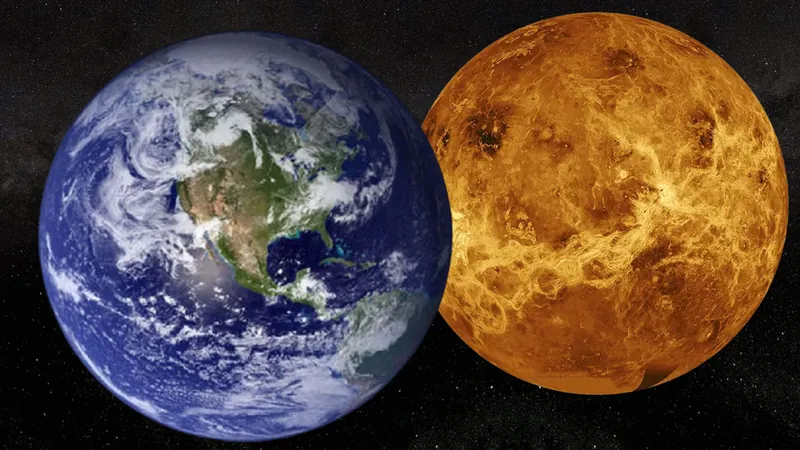
Venus: Earth's 'Evil Twin' and a Stark Warning for Our Climate Future
2024-10-07
Author: Wei
As scientists grapple with the alarming realities of climate change on Earth, they are turning their gaze towards Venus—often labeled as our planet's "evil twin." There is no denying that Earth is heating up, primarily due to greenhouse gases released by human activities. Interestingly, Venus, infamous for being the hottest planet in the solar system, has undergone a different but equally catastrophic climate evolution that may hold crucial lessons for our own planet.
A Tale of Two Planets
While Earth and Venus share some similarities in size, mass, and distance from the sun, their evolutionary paths have diverged dramatically. Initially, both planets might have borne a resemblance, complete with the potential for liquid water. However, countless volcanic eruptions on Venus, possibly billions of years ago, triggered a runaway greenhouse effect that transformed it into a blistering wasteland. Researchers are increasingly cautious about this phenomenon, as it serves as a dire example of unchecked climate chaos.
The situation on Earth is somewhat different; our greenhouse effect has been largely fueled by human actions—namely, the combustion of fossil fuels. Yet, warnings sent from space agencies like NASA and the European Space Agency increasingly show that we must heed the lessons Venus offers. Eryn Cangi, a research scientist at the Laboratory for Atmospheric and Space Physics, articulated the essential takeaway: "We can learn about terrestrial Earth-like planets by observing and studying Venus and interpreting it as an extreme case of what can happen."
Understanding Venus
The atmospheric pressure on Venus is a staggering 90 times that of Earth's, an environment akin to being nearly a mile deep in Earth’s oceans. This immense pressure, along with temperatures soaring to around 870 degrees Fahrenheit (465 degrees Celsius), creates a hellish landscape where liquid water cannot exist. While Earth’s highest recorded temperature was an extreme 134.1 degrees Fahrenheit (56.7 degrees Celsius), Venus obliterates this record and offers a horrific comparison.
Despite being situated closer to the sun, it is the thick, carbon-dioxide-rich atmosphere of Venus that drives its extreme temperatures, rather than mere proximity. In fact, scientists theorize that volcanic activity millions of years ago released vast amounts of greenhouse gases, catalyzing a transformational shift known as the "Great Climate Transition." This change led to boiling oceans and extreme atmospheric conditions, creating a feedback loop that trapped more heat and exacerbated the planet's hellish environment.
Lessons for Earth
Though some may fear for Earth's future, Cangi adds an interesting caveat: "I think it's pretty unlikely that Earth would end up the same as Venus." Currently, atmospheric carbon dioxide on Earth constitutes a minuscule 0.04%, a far cry from the 90 Earth atmospheres worth enveloping Venus. Nonetheless, this doesn't diminish the urgency to mitigate anthropogenic climate change. The societal and energy reforms needed to combat climate change on Earth also align with improving human health and economic stability.
Ongoing missions aimed at uncovering Venus's climate secrets provide hope and promise. NASA's DAVINCI mission, scheduled to reach Venus by the late 2030s, aims to descend through its dense atmosphere and collect unprecedented data. While its probe may not survive long, the knowledge gleaned from its brief journey could illuminate the mysteries enveloping our planetary neighbor.
The Future of Earth's Climate: A Call to Action
The parallels and lessons drawn from Venus are critical reminders of the importance of addressing climate change on our planet. As World Space Week spotlights the intersection between space technology and climate science, it is crucial that we invest in scientific exploration and conservation efforts. Venus serves as a harrowing yet insightful example, reminding us that the consequences of climate inaction could be far more severe than we can currently imagine.
As we embark on these journeys of discovery, we must also champion eco-friendly initiatives on Earth to ensure our planet does not follow down the path towards becoming the solar system's next "evil twin."





 Brasil (PT)
Brasil (PT)
 Canada (EN)
Canada (EN)
 Chile (ES)
Chile (ES)
 España (ES)
España (ES)
 France (FR)
France (FR)
 Hong Kong (EN)
Hong Kong (EN)
 Italia (IT)
Italia (IT)
 日本 (JA)
日本 (JA)
 Magyarország (HU)
Magyarország (HU)
 Norge (NO)
Norge (NO)
 Polska (PL)
Polska (PL)
 Schweiz (DE)
Schweiz (DE)
 Singapore (EN)
Singapore (EN)
 Sverige (SV)
Sverige (SV)
 Suomi (FI)
Suomi (FI)
 Türkiye (TR)
Türkiye (TR)